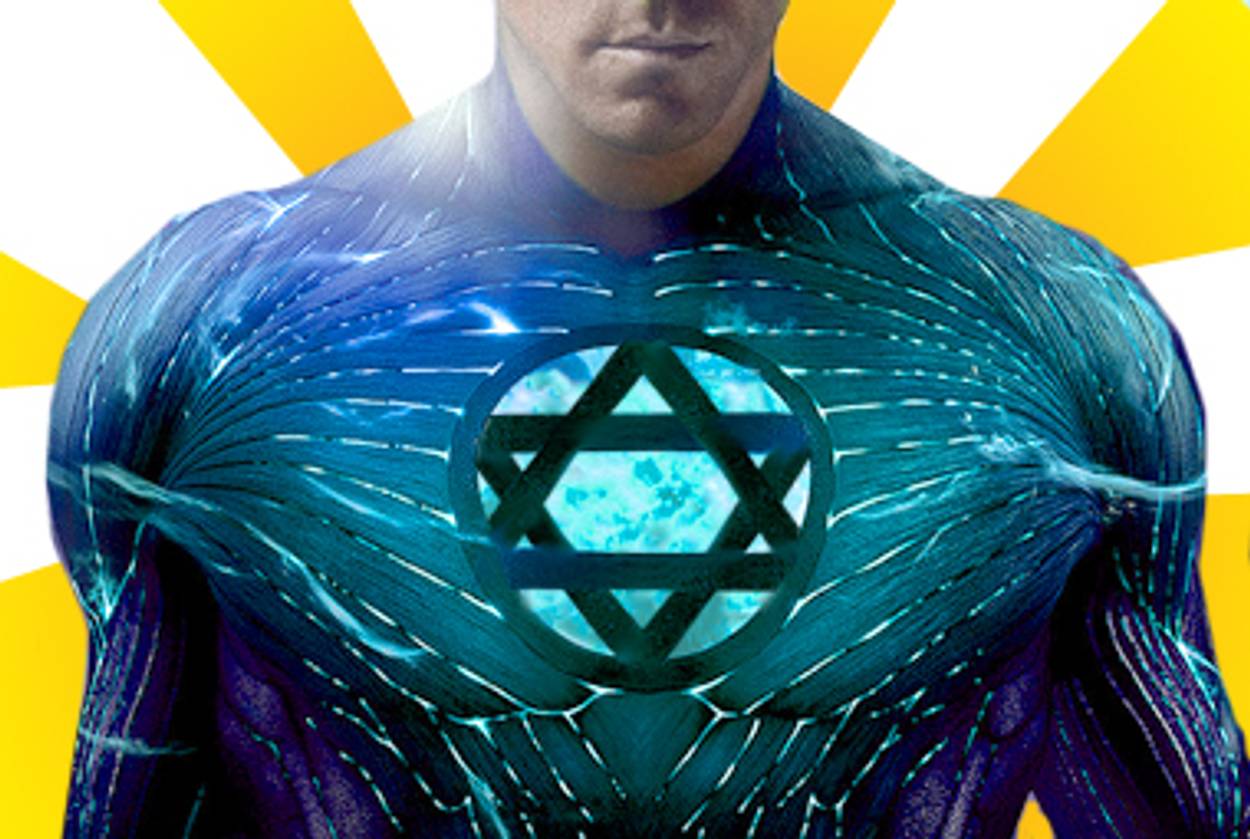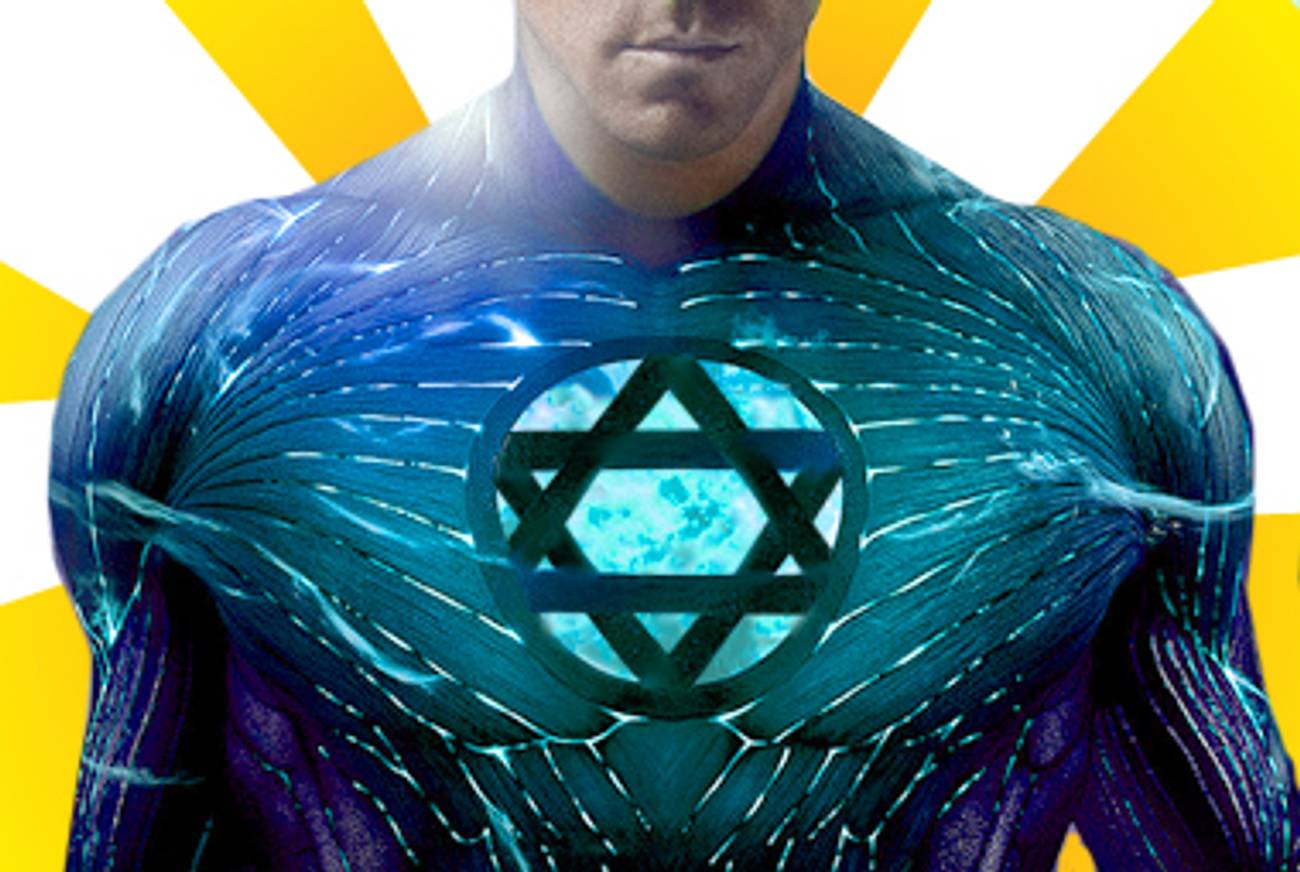Superbad
Recent superhero movies—Green Lantern, Thor, Superman—are terrible. The solution? Hollywood should make these heroes more Jewish.




Pity the comic-book fan who, with plucky optimism, skips to the movie theater to see one of this summer’s superhero flicks, only to leave two-and-a-half hours later with a CGI-induced hangover. Green Lantern was a travesty—you could feel the producers looming just off-camera, pleading with whatever fallen deities they pray to that this overdone stew of a movie would earn enough money to enable a franchise. Thor had moments of levity, and its star, Chris Hemsworth, appears to know his way around a Shake Weight, but the title character and his brother Loki seemed more like cosseted brats than Norse immortals locked in fratricidal conflict. Captain America, which will be released this Friday, is directed by Joe Johnston, a man who would probably rather forget the aughts (when he brought us Jurassic Park III, Hidalgo, and The Wolfman), and stars an actor, Chris Evans, whose best performance—by far—was a 10-minute cameo as an imbecilic action star in Scott Pilgrim vs. The World. Need we even bother?
There are plenty of other examples of terrible recent superhero films. There are some exceptions, of course, but most of the last decade—an era when Hollywood has supposedly rededicated itself to producing quality superhero movies featuring iconic characters—has been a wash.
What happened? Popular entertainment, after all, need not shy away from complexity or genuine moral conflict; the recent revival of Batman as the Dark Knight proved that well. Rather, the problem is one common to most superhero movies: Too often, filmmakers treat comic books as a brand rather than as source material, emptying them of all the intricacies and ironic reversals that made the beloved characters beloved in the first place. Put simply, contemporary superhero movies suck because they’ve forgotten their Jewish roots.
What I’m advocating here isn’t a cartoonish resort to stereotypes—Wolverine working as a mohel, after all, is an incongruity most of us aren’t ready for—but rather a return to the dynamic, complex, identity-focused storytelling that the American Jewish fathers of the comic-book industry produced so well.
One of this summer’s superhero movies almost gets it right. X-Men: First Class, which tells the story of the formation of the first X-Men under the tutelage of Professor X and Magneto, opens with a harrowing scene in Auschwitz, where Magneto, né Erik Lehnsherr, is separated from his parents, who wear the obligatory yellow star. His power—the ability to manipulate metal and magnetic fields—manifests in that traumatic moment. Later in the film, when asked to think back to a time when he was truly happy, Lehnsherr flashes back to lighting Hanukkah candles with his mother.
These markers of Jewishness are briefly presented and may seem clichéd, but they make First Class not only a very Jewish film but also an interesting if ultimately flawed one, a work of popular fiction concerned with the ethics of revenge. As Lehnsherr spends much of the movie hunting down the Nazi doctor who killed his mother, he turns into a cold, scarred man and eventually develops some ideological commitments that are not too far off from those of his German tormentors.
Unfortunately, all this wonderful complexity is abandoned in the film’s second half, a bizarre revisionist depiction of the Cuban Missile Crisis that throws around lines like “never again” and “they’re just following orders.” It’s as if the filmmakers want to leverage all of the moral authority of Jewish suffering without confronting any of the salient aspects of being Jewish. The tragic irony of Magneto—that he has taken on a version of the Nazis’ master race ideology, by literally believing that mutants are a “chosen people”—is lost amidst the computer-generated pyrotechnics and fatuous dialogue.
Like many recent superhero films, First Class, too, contains many Joseph Campbell-lite scenes—discovery of powers, early trauma, rejection of identity, assumption of responsibility, and so on. This isn’t a coincidence. In a short time, superhero movies have become remarkably derivative of their predecessors. Unwilling to connect to the characters’ true origins—those dark and layered stories that dealt with morality, mortality, race, powerlessness, rejection, and yearning—Hollywood is continually reinventing its superheroes, creating paler facsimiles of the original with each attempt. With 2012’s The Avengers, for example, the Hulk will have been rebooted three times in nine years, each time as a less compelling character.
The other recurrent feature of these movies is that the stakes are global but rarely personal. Many comics, true, have featured storylines with the entire world in danger, but this is by no means a rule. First Class, for example, could have done away with the Cuban Missile Crisis bunk and focused on the relationship between Magneto and fellow mutant Charles Xavier, the powerful mind-reader who opposes Magneto’s plan of mutant domination. The comics did just that: In Uncanny X-Men No. 161, the two men meet in Haifa, at a psychiatric hospital for Holocaust survivors, a meeting far more effective at establishing an enduring rivalry—and comics franchise—than First Class‘s bloated revisionism. The movie could have also benefited from the rich irony of Magneto’s early history, as presented in the comics: After he realized his philosophical outlook was incompatible with the more peaceable Xavier, he stole some Nazi gold—itself, of course, stolen from Jews—and used it to fund his mutant supremacy project.
There are many such storylines ripe for adaptation in the various superhero comic books, but they lose out to Hollywood’s maximalist impulse time and again. Add to that a raft of screenwriters (Thor had five credited writers), and the result is an amalgam of vignettes and traits related to the character without any overarching coherence.
It needn’t be this way. For a quick lesson on how to save superhero movies, let’s look at Iron Man. Currently, Robert Downey Jr.’s Tony Stark, Iron Man’s creator and alter ego, is the consummate limousine liberal, a weapons designer whose doubts about the unseemly sides of his profession sound, at best, half-hearted. From the original movie to the sequel, the character became flatter and simpler, bordering on the farcical and often depending on Downey’s considerable charms to rescue it. If the series’ studio handlers, however, looked at the comic books, they might discover some script gold in “Demon in a Bottle,” the 1979 Iron Man comic in which Stark plunges into an alcoholic spiral of self-destruction. It’s a dark and engaging story. It’s also one unlikely to make it to the multiplex anytime soon. Jon Favreau, who directed both Iron Man movies, referred to the story in a 2008 interview, saying, “I don’t think we’ll ever do the Leaving Las Vegas version.” It’s a pity: Downey, no stranger to addiction, could bring real depth to such a plot line; instead, all he’s allowed is one scene where he gets sloshed and makes a fool of himself at a party, destroying a gorgeous Los Angeles mansion while a popular DJ spins in the background.
Perhaps because their creators were forced to reckon with their sense of identity (Stan Lee and many of his peers anglicized their names), comics have been better than their filmic descendants at pushing their protagonists to extremes. In 1941, the now-famous cover of Captain America No. 1 showed the Cap fighting Nazis. A nebbishy, desperately patriotic Brooklyn boy (read: Jew) who, with the help of a Jewish scientist, was turned into a physical specimen, Captain America was created by Joe Simon and Jack Kirby, both Jewish. But even though he began as a Nazi-busting macho, he was never out of touch with the ambivalence with which so many Jews approach power. By 1969, at the height of the Vietnam War, Captain America has had a crisis of conscience, calling himself “an anachronism” in “the age of the rebel and the dissenter.” In Comics: Anatomy of a Mass Medium, Reinhold Reitberger and Wolfgang Fuchs describe this Captain America as “torn by self-doubts: the Hamlet of comics.” Like Hamlet, Cap feels unequal to the circumstances he faces: “Perhaps I should have battled less and questioned more!” There could be no sentiment more Jewish—to feel painfully out of step with the society whose ideals one has so ardently tried to uphold—and no better prescription for drama. There’s also very little chance that any of this ambiguity would ever be permitted to make a cameo in Captain America’s current Hollywood iteration.
One culprit for this cult of simplicity is technology. Ironically, it is the technology that would seem so well suited to transitioning comics to the big screen that has been the death of them. These movies have the sheen of unreality. There is no texture or grit. No environment looks lived or worked in. Sweat is rare. The stars are always gorgeous and too perfectly coiffed. Even in scenes without CGI, the aesthetic is CGI—the kind of high-gloss perfectionism found on the covers of fashion magazines.
And so, as Hollywood is beholden to bottom lines, let me state mine directly: It is the balance between the real and the superhuman, the Jewish and the assimilatory, the quotidian and the uncanny, that the Jewish pioneers of comic books understood and that is lost on most directors today. A century of Jewish-American literature, high and low, shows us that this kind of story has universal appeal. If Hollywood wants to save the superhero genre from inevitable oblivion, it has to learn how to capture the same tension for two hours.
Jacob Silverman is a Brooklyn-based freelance writer and book critic. He is also a contributing editor for the Virginia Quarterly Review.
Jacob Silverman is a Brooklyn-based freelance writer and book critic. He is also a contributing editor for the Virginia Quarterly Review.